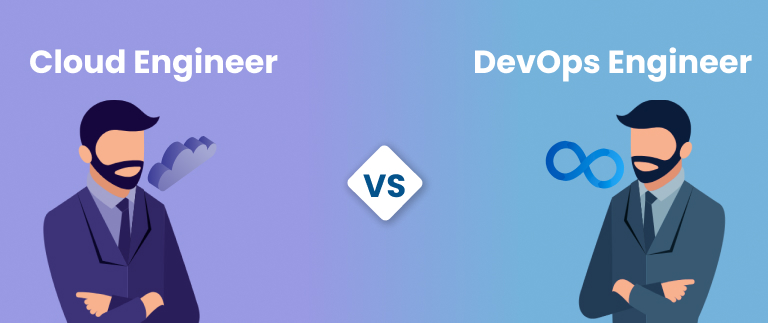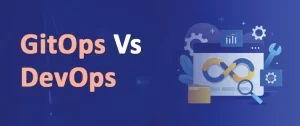Today, more and more IT companies are adopting DevOps methodologies. With the growing number of IT organizations, the trend does not look like stopping anytime soon. Anticipating better prospects, most IT aspirants are now turning to DevOps to make a remunerative living. However, landing a job is easier said than done. You have to be specific in the role that you are an expert in.
The DevOps sector is ever-evolving and lets you capitalize on different skills. You can become a DevOps engineer, DevOps architect, or DevOps lead. While each position is promising, cloud and DevOps engineers are getting more traction these days. Let us assess cloud engineer vs DevOps engineer to make the right decision.
Each DevOps and cloud engineer emphasizes continuous improvement and tries to optimize processes. Cloud Engineers seek performance optimization, whereas DevOps Engineers strive to improve the development and deployment pipelines. The global DevOps market share is likely to hit 24.71 billion dollars by 2027. So, it becomes necessary to identify the key differences within the sector to make the right choice for your company’s betterment.
What is DevOps Engineer?
A DevOps (development and operations) engineer works in information technology as a generalist to oversee the developmental and operational chores of creating software applications. These experts use their knowledge of programming and coding, system administration, network security, and infrastructure design to build and deploy software, internal networks, and secured database systems.
Engineers who focus their careers on DevOps also depend on agile methodologies for writing and testing code, programming system controls, and building different architectures that support operational applications and programs.
What is Cloud Engineer?
Cloud engineers are IT professionals who combine their knowledge and skills in software development, cloud computing, and network infrastructure to design, integrate, and track cloud computing systems. They develop cloud infrastructure for business as well as consumer use, including games, mobile applications, and online database systems.
In addition to this, cloud engineers work within the DevOps section, but their roles warrant cloud-based components and platforms. This means they do not program standalone applications or work with legacy code. Instead, they develop programs and systems for use across the Internet.
Difference Between DevOps and Cloud Engineer
While both engineers have common traits and work toward the betterment of technology development, there are some key differences between the two experts. Cloud Engineers work on cloud-specific projects, focusing on building/managing cloud environments and services. DevOps Engineers have a broader scope and work to integrate development and operations processes across different platforms. Let us analyze the cloud engineer vs DevOps engineer differences based on the below points.
Roles and Responsibilities
A Cloud Engineer focuses primarily on designing, integrating, and managing the cloud infrastructure and its related services. Also, these experts work on configuring networks, virtual machines, and storage in the cloud environment, ensuring availability, security, and scalability. On the other side, a DevOps Engineer mainly focuses on bridging the gap between development and operations teams. These professionals always focus on streamlining and automating the software development and deployment processes.
Let us take a close look at the technical responsibilities of DevOps vs cloud engineer to figure out the differences better.
Cloud Developer Tasks
A cloud engineer:
- Carries out the planning, technical, and operation support of cloud-based platforms
- Promptly resolves incidents and solves issues on the system’s administrative side
- Advises clients on the services provided, the specifics of their use, and the technical features of the services provided
- Performs external and internal integration service work
- Migrates applications to the cloud environment
- Develops and optimizes cloud-based applications
- Provides cost reduction and process automation through cloud services
- Maintains efficient statistics for cloud services
- Identifies performance hurdles in applications
DevOps Engineer Tasks
The main goals of DevOps include the following:
- Minimizes the time spent on developing software
- Increases the security and safety of development
- Reduces the risk of bugs that emerge in new releases
- Coordinates work and automate the processes of software development and release
- Plans, designs, and makes scripts and development tools
- Automates
- Participates in infrastructure and application development
- Implements monitoring tactics to control the product’s performance after release
Skills
When it comes to Cloud engineering vs DevOps skill set, there is some overlap. Also, some skills are more emphasized in each role. For instance, Cloud Engineers need an in-depth understanding of cloud platforms (AWS, GCP, and Azure), infrastructure as code (IaC) tools, networking, and security. DevOps Engineers require expert knowledge in CI/CD pipelines, configuration management tools, version control systems, scripting languages, and containerization.
Scope
Cloud Engineers primarily work on cloud-specific projects, with a focus on building/managing cloud environments and services. DevOps Engineers have a much broader scope and work on integrating and implementing development and operations processes across different platforms.
Certification
DevOps engineering is a field with many DevOps certifications and opportunities to advance your skills. For example, you might pursue credentials such as the Microsoft Certified DevOps Engineer Expert credential or the Cisco Certified DevNet Specialist. There is also a range of credentials beyond these options.
Even though cloud engineering has multiple credentialing options, they exist solely in cloud operations and computation. For example, the Google Associate Cloud Engineer credential extends to various areas of the field. Certifications in other cloud-based applications such as Microsoft Azure also exist for cloud engineers, but the opportunities for additional certificates in software engineering, design, and development are fields separate from cloud computing.
Education
Cloud and DevOps engineers enter their careers with a four-year degree. Beyond this similarity, each role can include different educational requirements. For example, DevOps engineers may emphasize their degrees in software development, computer engineering, or IT. A cloud engineer, on the other hand, focuses more on cloud computing. You can pursue many other fields to become a cloud engineer such as information security and computer networking.
Salary
While the salary potential for cloud, as well as DevOps engineers, is comparable, DevOps professionals can earn a higher average of $121,945 per year. On the contrary, cloud engineers earn $117,624 a year. Another difference in compensation is the lower range for cloud engineering compared to DevOps. While cloud engineers can earn an average base pay of $75,558 a year, DevOps engineering shows a much higher average of $80,409 a year.
Team Collaboration and Interactions
No team or employee works in a vacuum. Each DevOps and cloud engineer works and collaborates with various teams within the company.
Few software departments use both DevOps engineers and cloud engineers. Some products require classic DevOps, whereas others need more cloud infrastructure. The work related to setting up and using the cloud infrastructure may have the title of cloud engineer or DevOps engineer, depending on the company’s nature and its history.
DevOps engineers interact with different teams within an organization, including Quality Assurance, development, and operations teams. This is meant to streamline the process of software delivery and make it more efficient.
Cloud engineers usually interact with infrastructure, development, and operations teams as well. However, their primary focus is on the infrastructure that supports applications.
Similarities Between DevOps and Cloud Engineer
Despite the differences between DevOps and cloud computing, there are some similarities. Essentially, both concepts complement one another on various points. Let us review the similarities between DevOps and cloud computing based on the following points.
Cloud Knowledge
Both roles command a good understanding of cloud computing technologies and concepts. Cloud Engineers apply this knowledge to building and managing cloud infrastructure. DevOps Engineers tap cloud services for continuous integration and deployment.
Automation
Automation is a common facet of both roles. Cloud Engineers apply automation to efficiently manage and provision cloud resources, whereas DevOps Engineers automate software building, testing, and deployment processes.
Continuous Improvement
Both roles stress continuous improvement and try to optimize processes. Cloud Engineers seek performance optimization and cost-saving measures in cloud infrastructure. DevOps Engineers, on the flip side, aim to enrich the development and deployment pipelines for quicker and more robust software delivery.
Collaboration
Both roles involve working in collaboration with cross-functional teams. Cloud Engineers communicate and collaborate with security teams, system administrators, and network engineers, whereas DevOps Engineers work with testers, developers, and other IT teams to ensure seamless integration.
DevOps Engineer Vs Cloud Engineer: Which is Better Career?
DevOps Engineers encompass a wider skill set compared to Cloud Engineers which makes them a better set in the business. DevOps and Cloud Engineers have promising careers, and the prospects are interconnected because companies increasingly adopt cloud technologies as well as DevOps practices.
Professionals with a set of skills in both areas can find themselves in higher demand, as they can efficiently bridge the gap between cloud infrastructure management and software development. Ultimately, the choice between these roles must be based on individual skills, interests, and career aspirations, as both paths provide exciting opportunities in the tech industry.
Conclusion
Today’s businesses strive for revenue as well as cost savings. People with in-depth knowledge of DevOps concepts work for Docker containerization and seamless software delivery. They can change the course of business by implementing DevOps methodologies correctly, thus reducing costs significantly and building a truly productive workflow. Cloud engineers, on the other hand, build, integrate, optimize, and ensure the seamless operation of these platforms. Cloud also reduces infrastructure costs significantly and makes scaling issues a thing of the past. It is up to you to decide who wins the cloud engineer vs DevOps engineer battle by determining which one is ideal for your business.
| “Want to take your IT career to the next level? Explore our Advanced Cloud Native DevOps Master Program to enhance your DevOps career now!” |
Amol Shete
Senior Software Engineer
A well-experienced DevOps engineer who loves to discuss cloud, DevOps, and Kubernetes. An energetic team player with great communication & interpersonal skills.
FAQ's
DevOps Engineers have a much broader skill set than Cloud Engineers, which makes them a superset in the field. A Cloud and DevOps Engineer has promising career paths. Also, the futures of the two approaches are interconnected because companies increasingly adopt DevOps practices and cloud technologies.
DevOps Engineer salaries range from 4.1 Lakhs to 12.2 Lakhs a year in India, with an average salary of 6.1 lakhs per annum. Cloud Engineer salaries range from 3.2 Lakhs to 11.8 Lakhs a year in India, with an average salary of 5.5 lakhs per annum. So, DevOps engineers earn higher compensation compared to cloud professionals.
Both technologies have a great scope in the coming years. How? On one hand, all businesses are going online. So, the demand for cloud engineers will steep with the growing demand. On the other hand, all IT companies now rely on DevOps methodologies. So, DevOps engineers continue to remain in the limelight. In the end, both fields have a balanced demand. Countries applying more cloud technologies will need more cloud professionals. On the flip side, countries with a large number of IT companies will employ more DevOps engineers.





